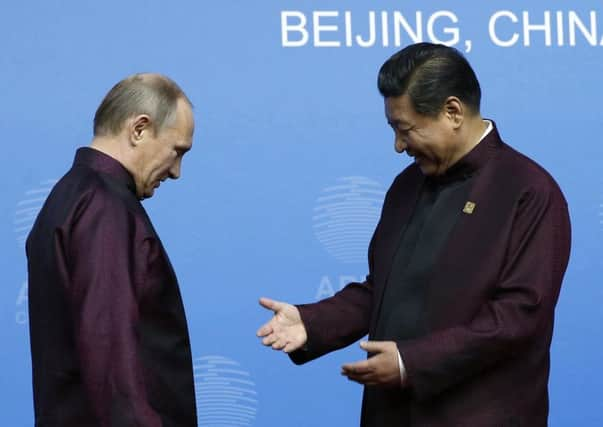China and Japan ease tension at summit


The two men posed briefly in front of cameras, stern-faced, and Mr Abe briefly said something to Mr Xi, who gave no response. They then entered a closed room at Beijing’s Great Hall of the People for 30 minutes, giving some hope that the two countries could reduce the friction in the talks arranged on the sidelines of this week’s Asia-Pacific Economic Co-operation summit.
The spat between China and Japan over uninhabited East China Sea islands and other contentious issues has raised concerns of a military confrontation between Asia’s two largest economies. Although core divisions will not be resolved soon, Mr Abe said afterward that the countries made a “first step” toward reconciliation.
Advertisement
Hide AdAdvertisement
Hide Ad“I believe that not only our Asian neighbours but many other countries have long hoped that Japan and China hold talks,” Mr Abe said. “We finally lived up to their expectations and made a first step to improve our ties.”
China also has been angry over what it sees as Japan’s efforts to play down its brutal 20th-century invasion of China.
CONNECT WITH THE SCOTSMAN
• Subscribe to our daily newsletter (requires registration) and get the latest news, sport and business headlines delivered to your inbox every morning
China’s leader must balance the need not to appear too accommodating to Japan, for his domestic audience, while still being statesman enough to host Mr Abe ahead of today’s summit, when the two men will join 19 other world leaders including President Barack Obama and Russian president Vladimir Putin.
China hopes to use the consensus-oriented summit to assert its ambitions for a larger leadership role in US-dominated trade structures.
The two sides issued a joint statement on Friday agreeing to gradually resume political, diplomatic and security dialogues and reaffirming the central pillars of their post-World War Two relations.
In the statement, Japan said it acknowledged differing views over the status of the islands, called Diaoyu in Chinese and Senkaku in Japan, a concession likely to please Beijing. China has long demanded that Tokyo agree that the islands’ sovereignty is in dispute, something Japan has refused to do for fear that would open the floodgates to further Chinese demands.
China and Japan have had poor relations for decades, rooted in Beijing’s enduring sense of victimhood and Japanese fears of China’s economic and political rise.
Advertisement
Hide AdAdvertisement
Hide AdJapan’s nationalisation of the islands in September 2012 infuriated Beijing, sparking anti-Japanese riots and raising regional security fears as Chinese patrol ships repeatedly entered the surrounding waters to confront Japanese coastguard vessels.
While anti-Japanese sentiment remains strong among the Chinese public, Mr Xi’s apparent willingness to set animosity aside and meet Mr Abe casts him in the role of global statesman, playing to China’s aspirations to be treated as a political equal by the West.
“The meeting marks a turning point in China-Japan relations and lays a good foundation for future developments,” said Feng Lei, a professor at the Centre for Japanese studies at Fudan University in Shanghai.”
SCOTSMAN TABLET AND IPHONE APPS